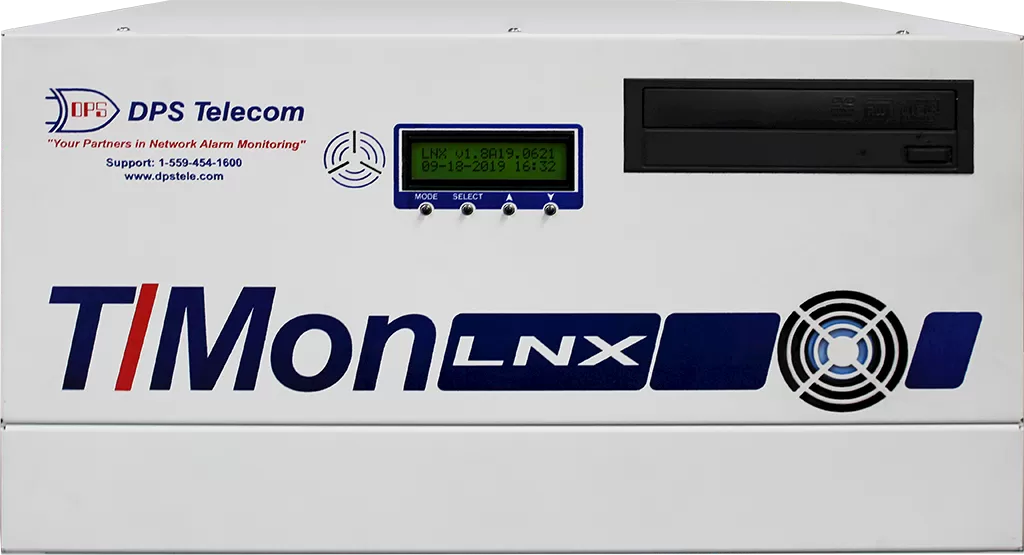Check out our White Paper Series!
A complete library of helpful advice and survival guides for every aspect of system monitoring and control.
1-800-693-0351
Have a specific question? Ask our team of expert engineers and get a specific answer!
Sign up for the next DPS Factory Training!

Whether you're new to our equipment or you've used it for years, DPS factory training is the best way to get more from your monitoring.
Reserve Your Seat TodayDPS manufactures remote monitoring systems for many different industries, including transportation and railway systems. Ensuring the reliability and safety of railway operations is critical, which often involves monitoring both remote trackside sites and control centers.
In a recent conversation between Jared, a DPS engineer, and a representative from a large railroad in the MENA region, the discussion centered around proposing a new alarm system for their extensive network of remote telecom sites and control centers.

A prospective client reached out to DPS Telecom with a clear objective: to find a reliable alarm monitoring solution for their 67 remote telecom sites and 8 control centers.
Each remote site has between 10-20 dry contact alarms, and the goal was to implement a master-slave design where all remote sites could transfer data to master units located in the control centers.
Here's the full online chat transcript from our website for your reference. I'll analyze this and discuss tech concepts for you afterward:
------------
Client: Hi, I am actually planning to propose a new alarm system for a large railway organization. They have 67 telecom remote sites and 8 control centers for operation. Can you please help/guide me through your products and how you can help me?
Jared: Hey, sure.
Client: Hi Jared.
Jared: We do a fair amount of monitoring for different railway companies. Typically, they have a number of sites along rails that would have one of our RTUs in them. Most of our RTUs have similar functionality; they mainly differ on the capacity of alarms, etc., that they can monitor. One of our highest capacity RTUs would be our NetGuardian 832A. dpstele.com/products/rtu/d-pk-netg5.php.
Client: Excuse me, I didn't provide much information. Each remote site includes 10-20 alarms, and the majority are (dry contact). I am thinking of a master-slave design where all remote sites can be the slaves, which transfer the data for each site to the master unit in the control centers.
Jared: Got it. For 10-20 dry contacts per site, I would recommend something with a bit less capacity. This unit can monitor up to 20 dry contacts: dpstele.com/products/rtu/d-pk-ng420.php. There would be one in each site, and they would all be able to report to a central collector like our T/Mon: dpstele.com/products/alarm-master/d-pk-tmlnx.php. With T/Mon, you would be able to configure and monitor all sites from a single screen.
Client: Can I have a sec to look at the link?
Jared: Absolutely.
Client: Thanks. I believe that NetGuardian 216 G4 supports 16 dry contact alarms?
Jared: Correct.
Client: What does "Pings up to 32 network elements" mean?
Jared: The device allows you to configure 32 devices that can be monitored with a heartbeat ping. For IP equipment that may not have any other monitoring available, it's sort of just an extra thing we put in our devices.
Client: Is the 20 discrete alarms working on the concept of normally open (NO) or normally closed (NC) scenario?
Jared: Yeah. They are normally open. They can be reversed through the web interface of the device, though. For example, if you wanted to monitor when a door was opened or closed, you wouldn't want there to be an alarm triggered when the door is closed. I can give you a demo if you'd like.
Client: Sure, please!
Jared: Can we do it in an hour? I'll get a meeting room and the device set up.
Client: Sure, can I bring one of our engineering team?
Jared: I'll email you the invite in a few minutes. Absolutely, bring anyone you'd like!
Client: OK, thanks again.
Jared: No problem. Talk to you soon.
Client: Hi Jared, I just sent an email to you. Can you confirm that you've received it?
Jared: I got it.
Client: Thanks again for your effort. I will be waiting for your feedback.
Jared: No problem. I'll have a proposal out to you by the end of the day.
Client: That would be great. Enjoy your day.
Jared: You too.
----------------
Jared immediately understood the client's requirements and began by suggesting appropriate products that align with their needs. He recommended the NetGuardian 832A, a high-capacity RTU suitable for larger sites.
However, after receiving and considering additional specifics provided by the client ("10-20 dry contact alarms per site"), Jared suggested a more tightly tailored solution:
"For 10-20 dry contacts per site, I would recommend something with a bit less capacity. This unit can monitor up to 20 dry contacts: NetGuardian 420 G6."
The NetGuardian 420 G6 is ideal for medium-capacity needs, offering 20 discrete alarms and additional functionalities like a built-in terminal server for remote management. This device ensures robust monitoring without the need to pay for excessive capacity, making it cost-effective and efficient for this specific railroad project.

To centralize the data from all remote sites, Jared recommended using the T/Mon alarm master system. T/Mon is a versatile network alarm manager capable of collecting alarm data from various equipment across different protocols and displaying it on a single interface:
"With T/Mon, you would be able to configure and monitor all sites from a single screen."
"T/Mon supports multiple protocols, including SNMP, ASCII, and more. This means you can continue using your existing equipment while still gaining the advanced monitoring capabilities of our new systems."
T/Mon's ability to integrate with multiple protocols ensures that the railroad can seamlessly incorporate their existing equipment and expand their monitoring capabilities without significant overhauls. T/Mon can manage both DPS NetGuardians (obviously) but also a variety of third-party gear that uses SNMP or other standard or proprietary protocols.
Understanding Technical Details
The client delved deeper into the technical capabilities of the NetGuardian devices, asking specific questions about features like network element pings and the exact functionality of discrete alarm inputs. Jared gave the following answers:
"The device allows you to configure 32 devices that can be monitored with a heartbeat ping. For IP equipment that may not have any other monitoring available, it's sort of just an extra thing we put in our devices."
This feature ensures that all network elements are operational and can be monitored in real-time, providing an added layer of security and reliability.
Customizing Alarm Settings
The client was particularly interested in the flexibility of the discrete alarms, specifically their normally open (NO) or normally closed (NC) configurations. Jared confirmed that the alarms are normally open but can be reversed through the web interface, providing versatile monitoring options:
"For example, if you wanted to monitor when a door was opened or closed, you wouldn't want there to be an alarm triggered when the door is closed."
NC alarm wiring is "self-monitoring" in the sense that a cut wire is detected as an alarm. It's the breaking of a circuit, not the closing of one, that triggers a NC alarm.

One of the key concerns for any large railroad operation is ensuring the security of their remote sites. Our client wanted to ensure that their alarm system could provide detailed monitoring for various potential security threats.
Jared explained how the NetGuardian series can be equipped with sensors to monitor environmental conditions and physical security:
"Our NetGuardian RTUs can be paired with a variety of sensors to monitor temperature, humidity, and even door contacts. This ensures you not only get alerts about operational issues but also any unauthorized access to your facilities."
These features are crucial for maintaining the security and integrity of remote sites, especially in critical infrastructure like railways. By integrating environmental and security monitoring, the railroad can have a comprehensive view of their sites' statuses, ensuring they can respond promptly to any threats.
Another critical feature that appealed to our client was the ability to manage and control remote sites in real-time. Jared highlighted the remote control capabilities of the T/Mon system:
"With T/Mon, you can remotely control relays and other equipment at your sites. This means you can perform tasks like rebooting equipment or adjusting settings without having to send a technician to the site."
Remote management capabilities are essential for reducing operational costs and ensuring quick response times. This feature allows the railroad to maintain high operational standards without the need for frequent site visits, which can be both time-consuming and costly.
Understanding the importance of a hands-on demonstration, Jared offered to set up a live demo session to showcase the capabilities of the recommended devices. This step is crucial in helping the client visualize how the system works and how it can be integrated into their existing infrastructure:
"I'll email you the invite in a few minutes. Absolutely, bring anyone you'd like!"
By providing a live demonstration, DPS Telecom ensures that clients like this large railroad in the MENA region can make informed decisions based on actual real-time interactions with the equipment.
As this railroad looks to the future, scalability was a significant concern. They needed a solution that could grow with their operations. Jared explained how DPS Telecom's systems are designed with scalability in mind:
"Our NetGuardian RTUs and T/Mon system can be expanded as your needs grow. You can add more sensors, RTUs, and even integrate additional protocols without significant reconfiguration."
This flexibility ensures that the railroad can adapt their monitoring system to accommodate new sites, additional equipment, or changing operational requirements. The ability to scale efficiently is vital for any growing operation, providing peace of mind that their investment will continue to meet their needs well into the future.
Towards the end of the conversation, Jared emphasized DPS Telecom's commitment to ongoing customer support and satisfaction:
"We offer comprehensive support and training to ensure you can fully utilize our systems. Our goal is to build long-term partnerships with our clients, providing the tools and assistance you need to keep your operations running smoothly."
By offering training, ongoing support, and a robust warranty, we ensure that you have the resources you need to effectively manage your monitoring systems and address any issues that may arise.
This detailed conversation between Jared and the client underscores DPS Telecom's ability to provide tailored, scalable, and secure monitoring solutions for large railroad operations. By leveraging advanced technologies like the NetGuardian RTUs and T/Mon alarm master, the railroad can enhance their operational efficiency, security, and scalability.
If you need a customized monitoring solution that grows with your needs and ensures comprehensive security and operational oversight, contact DPS Telecom today. Our expert engineers are ready to assist you in designing and implementing a solution that meets your precise requirements.
To get started, call DPS Telecom now at 1-800-693-0351 or email sales@dpstele.com

Andrew Erickson
Andrew Erickson is an Application Engineer at DPS Telecom, a manufacturer of semi-custom remote alarm monitoring systems based in Fresno, California. Andrew brings more than 19 years of experience building site monitoring solutions, developing intuitive user interfaces and documentation, and opt...